Australia is working with its global allies and keeping an eye on Russia following extraordinary scenes involving a mercenary group crucial to its war against Ukraine.
The foreign affairs minister, Penny Wong, said on Sunday that “Australia is closely monitoring developments in Russia”.
The security situation is evolving and we are working closely with partners.
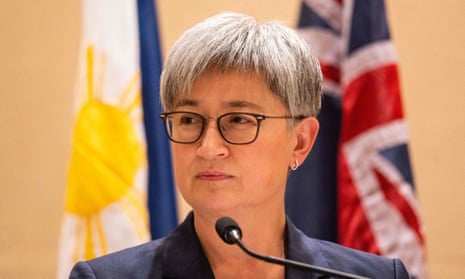
Senator Wong also said Australians in Russia should leave immediately because the security situation could deteriorate further.
Australia’s travel advice for Russia is “do not travel” and the government has warned its ability to provide consular help in the country is limited and it won’t be able to facilitate evacuations.
Late on Saturday, the heavily armed Russian mercenaries from the Wagner company who were on their way to Moscow after threatening the president, Vladimir Putin, and his top defence brass began turning back.
But overnight, Belarus intervened and brokered a deal, with Putin’s approval, to halt the further movement of Wagner troops on Moscow in return for guarantees of their safety.
Kremlin spokesperson Dmitry Peskov said Wagner’s leader, Evgeny Prigozhin, would move to Belarus under the deal, but the situation remains unstable and is being closely watched by the US, France, Germany and Britain and their allies.
– Reuters
Thousands of people have marched across the Sydney Harbour Bridge on Sunday morning to take part in the FIFA Women’s World Cup 2023 Unity Celebration.
The event comes ahead of the July 20 kick off in a tournament held in partnership between Australia and New Zealand with nine cities playing host to games.
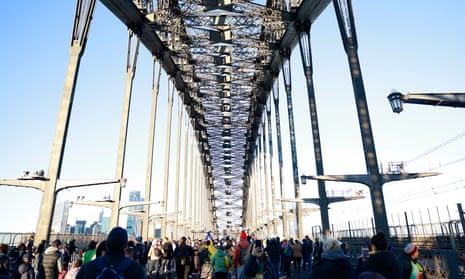
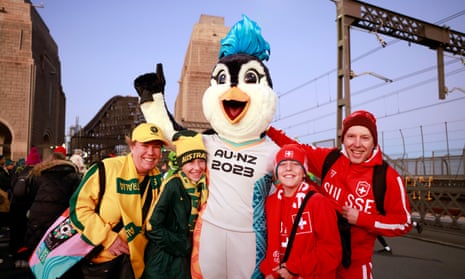
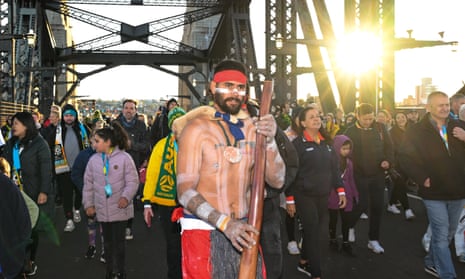
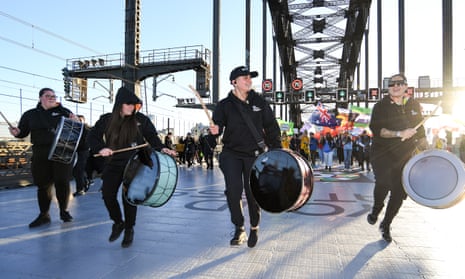
Melbourne has Australia’s worst heroin problem. Why can’t it kick the habit?
Jill Mellon-Robertson’s son was on the cusp of adulthood when he was diagnosed with schizophrenia. Soon after that he began smoking marijuana.
For him, you’re 17, you’re wanting to be cool and it wasn’t cool to have a mental illness. It was cool to smoke a bit of dope.
He was in the space – he was a musician and an artist. It’s all about the space and what’s cool.

Over the next two decades, Jahn battled drug addiction. In his early 20s, he began using heroin, the drug that would ultimately kill him in 2015 at the age of 38.
“With heroin, he said [he] could just chill out and he felt very relaxed and the day would go quick – he didn’t have to think about it,” Mellon-Robertson says.
Victoria accounts for 45% of the nation’s heroin consumption, according to wastewater analysis conducted by the Australian Criminal Intelligence Commission (ACIC), with Melbourne use per person approximately 70% higher than Sydney, and at least five times most other Australian capitals.
Yet as the city remains embroiled in heated debates over injecting rooms, crime and health responses – few are asking why Melbourne hasn’t been able to kick its heroin habit.
For more on this story read the full feature by Guardian Australia’s Victorian state reporter Adeshola Ore.
Another Labor upset in Fadden a longshot: PM
Anthony Albanese says the chance of another Labor upset during the byelection for the federal seat once occupied by the controversial former Liberal minister Stuart Robert is “very long odds”.
The byelection in the Queensland seat of Fadden was triggered following Robert’s resignation. Robert served as the veterans’ affairs, national disability insurance scheme and government services minister under the Turnbull and Morrison governments.
Speaking to Sky News in a prerecorded interview on Sunday, Albanese said the ALP candidate Letitia Del Fabbro, a local nurse educator, was starting at “very long odds”.
But he criticised Robert for not attending parliament to explain why he was resigning “under such a cloud”.
People will ask why is it that this money is having to be spent on this byelection with someone who just has made that resignation.
We think this is unnecessary and shouldn’t have happened.
Albanese said Del Fabbro was a strong candidate and he would launch her campaign in the next few days.
Fadden is held by the LNP with a margin of 10.6% and the party has chosen the Gold Coast councillor Cameron Caldwell as its candidate.
– AAP
Inflation pressures tipped to hit retail spending
The peak body representing the country’s retailers is hopeful Australians will spend more this year than in 2022 on mid-year sales despite cost-of-living pressures.
The Australian Retailers Association this month released the results from a poll indicating shoppers would spend $9.3bn on sales this year, up $500m from 2022.
But fewer Australians overall were planning to splash out – 5.8 million, down 400,000 from 2022, according to the Roy Morgan SMS poll of more than 3000 people.
ARA’s CEO, Paul Zahra, she was expecting to spend an average of $1,616, up almost $200 from 2022 despite concede that inflation was having an effect.
We’re in the midst of a cost-of-living crisis and this is certainly reflected by the fact that 400,000 fewer Australians will be opening their wallets in the mid-year/EOFY sales.
The poll was conducted between 19 May and 24 May, before the Reserve Bank of Australia’s surprise rate hike on 7 June.
The latest ANZ-Roy Morgan consumer confidence figures, based on 1,480 interviews in the week to last Sunday, found consumer confidence was at its lowest level since April 2020.
ANZ senior economist Adelaide Timbrell said confidence had been at extremely weak levels for about 15 weeks but had dropped even more sharply since the rate hike and was close to its lowest level since March 2020.
– AAP
GetUp rolls out new yes campaign
Activist group GetUp is backing the yes vote in the upcoming national referendum on an Indigenous voice to parliament.
The progressive left-leaning advocacy group will launch its #WriteYes campaign in Cairns on Sunday and hold a similar event in Alice Springs on Wednesday.
GetUp’s First Nations justice campaign director, Amy Gordon, said, “We’re really in a historic moment.”
And it’s not just because we’re going to a referendum but because this is a moment where the whole country is talking about First Nations justice and this is a really incredible opportunity to build momentum.
Our aim is to create space for long-term First Nations justice and that includes treaties, truth telling and land rights.
We really see this referendum being a stop along the journey and not the final destination.
Gordon said the referendum “isn’t going to fix all of the issues in our communities,” but it will add pressure to governments to listen to Indigenous people on issues that matter to them.
It won’t stop deaths in custody but what it will do is show our political parties, our government, that there is huge momentum across Australia to actually be listening to First Nations people on these issues and being building momentum towards that justice.
GetUp is also encouraging people to enrol to vote and do whatever they can to combat misinformation about the voice.
– AAP
Australia is working with its global allies and keeping an eye on Russia following extraordinary scenes involving a mercenary group crucial to its war against Ukraine.
The foreign affairs minister, Penny Wong, said on Sunday that “Australia is closely monitoring developments in Russia”.
The security situation is evolving and we are working closely with partners.

Senator Wong also said Australians in Russia should leave immediately because the security situation could deteriorate further.
Australia’s travel advice for Russia is “do not travel” and the government has warned its ability to provide consular help in the country is limited and it won’t be able to facilitate evacuations.
Late on Saturday, the heavily armed Russian mercenaries from the Wagner company who were on their way to Moscow after threatening the president, Vladimir Putin, and his top defence brass began turning back.
But overnight, Belarus intervened and brokered a deal, with Putin’s approval, to halt the further movement of Wagner troops on Moscow in return for guarantees of their safety.
Kremlin spokesperson Dmitry Peskov said Wagner’s leader, Evgeny Prigozhin, would move to Belarus under the deal, but the situation remains unstable and is being closely watched by the US, France, Germany and Britain and their allies.
– Reuters
Social media giants could be fined 5% of their global turnover for “systemic breaches” of misinformation rules, under a new framework proposed by the federal government.

The communications minister, Michelle Rowland, today unveiled a consultation period to give the Australian Communications and Media Authority (Acma) more power to “hold digital platforms to account for harmful misinformation and disinformation online.” But the government is also being careful to stress a balance between fighting harmful misinformation, and protecting freedom of speech.
Acma will be given powers to obtain information and documents from digital platforms about how they are responding to mis and disinformation; if the platforms fail to respond appropriately over a period of time, Acma would be able to create enforceable industry codes with significant penalties, or to create a standard requiring platforms to increase their efforts.
The government proposes that systemic breaches of a registered code could be penalised by up to $2,750,000 or 2% of global turnover (whatever is greater) for corporations; and systemic breaches of a standard to be penalised by up to $6,880,000 or 5% of global turnover (whatever is greater) for corporations.
Codes or standards could include measures such as stronger tools to empower users to identify and report misinformation and disinformation, ensure more robust complaints handling, and enable more extensive use of factcheckers.
Public consultation is open until 6 August, and the government plans to introduce legislation later this year.
Mis and disinformation sows division within the community, undermines trust and can threaten public health and safety.
This consultation process gives industry and the public the opportunity to have their say on the proposed framework, which aims to strike the right balance between protection from harmful mis and disinformation online and freedom of speech.
Australians shouldn’t listen to scare campaigns when considering how to vote in a referendum to enshrine an Indigenous voice in the constitution, the prime minister, Anthony Albanese, says.
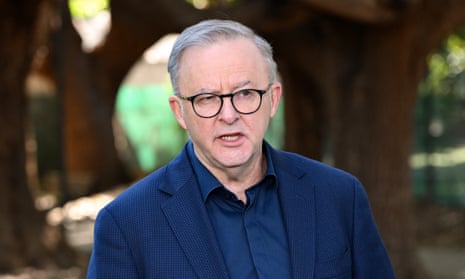
Despite recent polling showing reduced support for the proposal, the federal government is on track to hold the referendum in the last quarter of 2023.
This is a very simple proposition to recognise Indigenous Australians in our constitution, in our founding document, and it’s time that we did that.
I believe most Australians will accept that … It’s not a complex proposition, it doesn’t change any of the ways that we are governed, it just provides for the opportunity for Indigenous people to have a say in matters that affect them.
Albanese said he wanted Australians to vote on the facts, not fearmongering. He compared the upcoming referendum to parliament’s apology to the stolen generations in 2008, which opponents claimed would be divisive and result in large compensation claims.
We know that it was a moment of national unity, the scare campaigns weren’t right … it didn’t have an impact on most Australians except they felt better about who we were as a country.
If we recognise Indigenous Australians in our constitution, people will look back and say, ‘Why didn’t we do it earlier?’, just like people say why didn’t we make the apology earlier.
– AAP
Despair returns to Lismore for those left out of flood buyback program
Phones started pinging across Lismore last Tuesday afternoon as a fresh wave of fury and confusion crashed upon the northern rivers town.
Nearly 16 months after the first of two catastrophic floods inundated the New South Wales town – claiming five lives, swamping thousands of homes and robbing residents of untold treasured possessions – many survivors are still to learn which of the long-promised government assistance packages might apply to them.
Will the state government’s Northern Rivers Reconstruction Corporation offer to buy their home and ensure no one else relives their trauma on that piece of land again?
Will they be offered money to raise their homes, or retrofit them with more flood-resilient materials?
Or will they be left adrift to seek what shelter they can from a housing market in crisis?
Kay Armour was among those hoping to be offered a lifeline.
For more on this story, read the full feature by Joe Hinchcliffe.
Collins on Indigenous voice and housing
The interview closes with a question about the future of the Indigenous voice to parliament: how would the minister treat advice from an Indigenous voice? Would she treat it differently to what she is currently getting from other groups?
I’m already listening to Indigenous Australians around how do we close the gap. I am the minister responsible, as you said, for closing the gap when it comes to housing. I think it’s Closing the Gap target 9A. I had a meeting just this week with Indigenous in Victoria and in terms of national Indigenous and Torres Strait Islander Housing Association – we want to work with them to get capacity, so that they can actually provide support and advice in terms of what is required. So I would absolutely be listening to the voices of Indigenous Australians when it comes to housing and closing that gap. The important point here, David, of course, is that our Housing Australia Future Fund also included $200m for repair and maintenance to remote and Indigenous housing.
But what about a voice specifically?
Well it would obviously give us more voices around the country and the way it is established. We were talking about getting input from right across the country. At the moment obviously I can’t talk and speak to every single Indigenous voice in the country, so he it would centralise that and provide us with very good advice on how do we close the gap.
And that’s a wrap.
Collins reiterates government’s focus on supply
Collins is asked about her comments in opposition saying “Any solution to Tasmania’s housing and rental affordability crisis must include federal reforms to negative gearing and capital gains tax.”
Does she still agree with them?
There have been two elections in that interim period. What we’ve been told to do is add to supply. That’s what we’re focused on, adding to supply. Those things are not on the government’s agenda and we are busy adding to supply and we are doing that at every opportunity we have.
Collins says the country’s housing ministers are actively looking at the issue but would not commit on whether a national approach is needed to addressing the issue.
What the housing ministers have done, we’ve had four meetings, it has been raised at some of those meetings. We are looking at the different interventions in each state and territory and the data around what is working.
I always have the Affordability Council, which is essentially a panel of experts, looking at around what small wins we can get quickly to add to supply, and they will look at all of those but again the states and territories need to move in terms of this. They have the powers.
Airbnb ‘no doubt’ driving up rents: Collins
Collins says the issue is “very personal for me” having spent part of her childhood in public housing.
I understand the struggles. I understand how difficult it is to make sure that more Australians have a safe, affordable place to call home. I am driven every day to do more to make sure that we as a federal government step town the plate.
The minister says “there is no doubt” that Airbnb is having a role in driving up rents by converting housing to short-term rentals particularly in markets with large tourism industries.
I do think that Airbnbs, and I’ve looked at some of the data, and again the Australian urban Research Council has said they are having an impact where tourism is high. There is no doubt they are having some type of impact. There is no data and evidence around what types of interventions will actually work.
Collins says the government plans to put “renters rights on the National Cabinet agenda” – and will add to supply with its build to rent program.
She also says the government has been accomodating of the Greens’ request. The government received a letter “outlining eight different things they wanted” and that the government “moved on all eight of those”.
You’ve seen us talk about that publicly before We have support of some in the Senate. We are having conversations about getting this through, but what we saw last week is actually something blocking something which will deliver homes on the ground When people say there is no cost to the decision and delays don’t matter, they do matter, and they matter to people on the front line, they matter to people sitting on the public housing list, they matter to people fleeing violence, they matter to veterans at risk of homelessness and it matters in a practical way.
